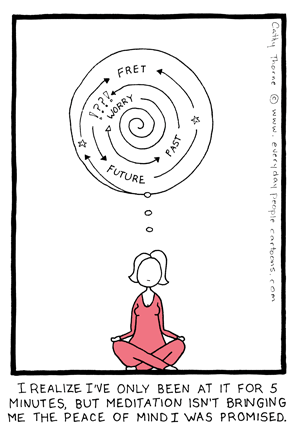Confused about meditation?
What is meditation? Why should I do it?
These are common questions, and we enjoy discussing the answers in detail (see our writing index for examples).
But, over the years, it became necessary to come up with a simple explanation to use in short conversations.
The simple explanation seems to resonate with people. We share several versions below (all less than 60 seconds) - feel free to use them when talking to friends and family.
These are common questions, and we enjoy discussing the answers in detail (see our writing index for examples).
But, over the years, it became necessary to come up with a simple explanation to use in short conversations.
The simple explanation seems to resonate with people. We share several versions below (all less than 60 seconds) - feel free to use them when talking to friends and family.
Meditation explained in around 12 seconds:
Meditation isn't about "shutting everything out" or trying to stop thoughts. It's about becoming aware of thoughts. It's learning to observe them without getting caught up in them.
Meditation explained in around 45 seconds:
Our normal state is "lost in thought."
This state conditions our behavior (including decisions, actions, and reactions) and leads to the struggles we all face:
Meditating is a dedicated exercise that strengthens awareness of your mind and its non-stop activity. You develop the skill of observing it all without getting caught up in it.
Through consistent practice, you learn to stop following your mind wherever it leads (i.e., you learn to stop being "lost in thought"). This allows you to break free from conditioned behavior and the struggles it leads to.
Put another way, you are no longer held hostage by the next thought, emotion, or urge that pops into your head.
This state conditions our behavior (including decisions, actions, and reactions) and leads to the struggles we all face:
- stress
- endless worry
- extreme emotions
- an inability to break bad habits
- feelings of anxiety and depression
- a negative self-image
- sleep problems
- tension headaches
- neck and back pain
- a lack of focus
- and on and on...
Meditating is a dedicated exercise that strengthens awareness of your mind and its non-stop activity. You develop the skill of observing it all without getting caught up in it.
Through consistent practice, you learn to stop following your mind wherever it leads (i.e., you learn to stop being "lost in thought"). This allows you to break free from conditioned behavior and the struggles it leads to.
Put another way, you are no longer held hostage by the next thought, emotion, or urge that pops into your head.
meditationSHIFT explained in one sentence:
Your mind creates A LOT of drama - meditationSHIFT teaches you how to avoid getting swept away by it.
You don't have to control you mind, you just have to stop letting your mind control you. - meditationSHIFT
<>
Explore more:
"Your inner narrative" - read Day 1 of our 15-day self-study course, and learn to stop getting caught up in the stories your mind tells you.
Explore more:
"Your inner narrative" - read Day 1 of our 15-day self-study course, and learn to stop getting caught up in the stories your mind tells you.

